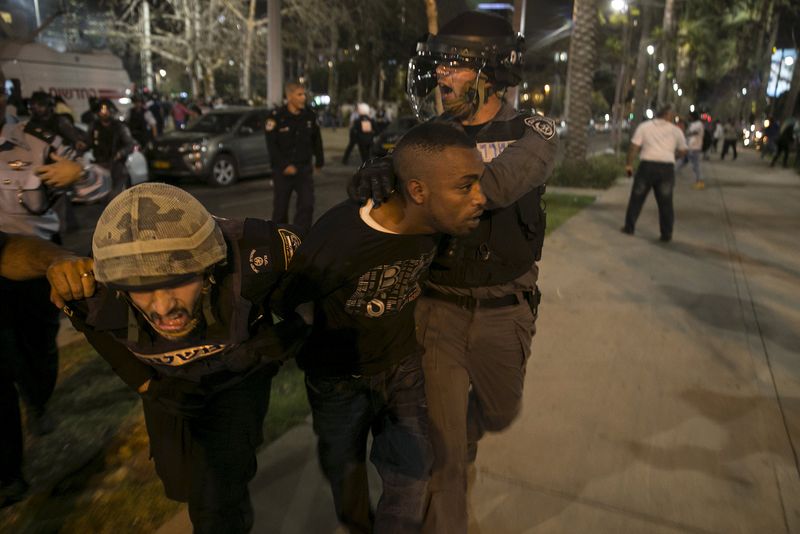By Luke Baker
JERUSALEM (Reuters) - Images of Israeli police firing stun grenades are usually set in the West Bank and involve Palestinian protesters. But on Sunday the situation was quite different - riot police battling thousands of Ethiopian Jews in the centre of Tel Aviv.
The spark was a week-old video showing two Israeli policemen punching, beating and trying to arrest an Israeli soldier of Ethiopian descent in what appeared to be an unprovoked attack.
The two-minute video is the latest in a string of incidents that have raised uncomfortable questions about Israel's treatment of ethnic minorities and its struggle to integrate newcomers into broader society, whether Jews or non-Jews.
On Monday, Prime Minister Benjamin Netanyahu met the soldier, Damas Fikadeh, at his Jerusalem office and hugged him.
"I was shocked by the (video) footage," he said on Twitter (NYSE:TWTR). "We cannot accept it, and we will change it."
Some commentators have highlighted latent racism in a country that has absorbed millions of migrants over the past 60 years but still agonizes over differences between East European and Middle Eastern Jews, relations with its large Arab minority, and how to handle more recent arrivals from Africa.
"There is a problem, there are discrimination issues, there is racism in Israel," said Fentahun Assefa-Dawit, the director of Tebeka, an advocacy group for Ethiopian Israelis, who number around 130,000, many of them born in Israel.
"We want the prime minister to take this matter into his hands," he said moments before he was due to meet Netanyahu. "We urge him, we demand of him, to bring these issues to an end."
DEEP SEATED PROBLEMS
In the run-up to Israel's election in March and the weeks since there have been a series of violent incidents, comments by politicians and policy proposals that have fuelled concerns the country has a race problem - not just when it comes to the 20 percent Arab population but to minority Jewish groups too.
Last week, an Ethiopian Jew said he was beaten by inspectors from Israel's population and immigration authority because they thought he was a migrant from Sudan or Eritrea. The immigration authority said the man attacked the inspectors first.
On the day of the election on March 17, fearing he could lose, Netanyahu said "Arab voters are coming out in droves", comments that offended the Arab-Israeli population and drew accusations of racism. The prime minister later apologised.
For months, Israel has been threatening to imprison thousands of illegal African migrants if they do not agree to be deported to third countries in Africa, despite the Supreme Court expressing deep reservations about the policy.
In the 1990s, Israeli officials confirmed that blood donated by Ethiopian Israelis had been thrown away out of fear that it could be infected by HIV and other diseases.
Racism in Israeli society is "far more commonplace and far more toxic than we dare tell ourselves," leading political commentator Nahum Barnea wrote in Yediot Ahronoth on Monday.
"Hatred of the other, or of anyone perceived as being the other, is not only deeply rooted here, but it also receives encouragement from politicians on the eve of elections."
Ben Caspit, a columnist with Maariv newspaper, said it was not up to Netanyahu to resolve how the Ethiopian community is treated but for all Israelis to wake up and address it.
"The people who are to blame for the terrible things that the members of this lovely community have been forced to undergo on a daily basis is us," he said.
"Those among us who turn up their noses when an Ethiopian family enters the neighbourhood, those among us who are not happy to see Ethiopian children in their children's classroom."
Around 20,000 Ethiopian Jews, who trace their roots to the biblical King Solomon and the Queen of Sheba, were brought to Israel on secret flights in the mid 1980s and early 1990s.
The offspring of those early arrivals have worked hard to integrate, many serving in elite units of the army with distinction. An Ethiopian woman won a recent Miss Israel beauty contest. But after mandatory military service, acceptance in the workplace has proved more of a struggle for many.
"When an Ethiopian applies for a job, as qualified and impressive as he might be, he is not going to be invited for an interview because he has an Ethiopian name on his CV," said Assefa-Dawit of Tebeka, the advocacy group.

"Israel is our country, there's no 'us and them'. This is our home. The community is crying out for the government to resolve this."